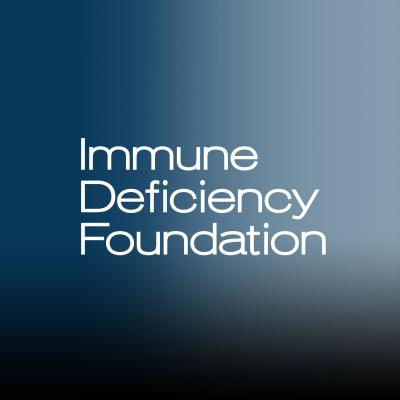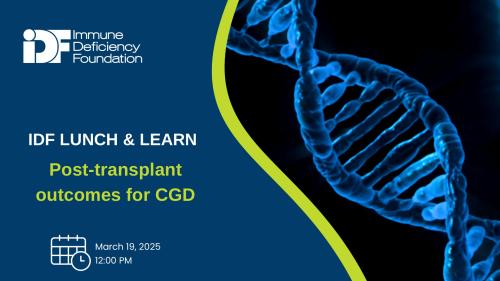
-
Understanding primary immunodeficiency (PI)

Understanding PI
The more you understand about primary immunodeficiency (PI), the better you can live with the disease or support others in your life with PI. Learn more about PI, including the various diagnoses and treatment options.
-
Living with PI
-
Addressing mental health
-
Explaining your diagnosis
- General care
- Get support
- For parents and guardians
-
Managing workplace issues
- Navigating insurance
-
Traveling safely

Living with PI
Living with primary immunodeficiency (PI) can be challenging, but you’re not alone—many people with PI lead full and active lives. With the right support and resources, you can, too.
-
Addressing mental health
-
Get involved

Get involved
Be a hero for those with PI. Change lives by promoting primary immunodeficiency (PI) awareness and taking action in your community through advocacy, donating, volunteering, or fundraising.
-
Advancing research and clinical care
-
Grants
-
IDF surveys
-
Participating in clinical trials
-
Diagnosing PI
-
Consulting immunologist
-
Clinician education

Advancing research and clinical care
Whether you’re a clinician, researcher, or an individual with primary immunodeficiency (PI), IDF has resources to help you advance the field. Get details on surveys, grants, and clinical trials.
-
Grants
When a baby is born with severe combined immunodeficiency (SCID), parents are faced with making a major decision about treatment within a short period of time. A baby with SCID has no immune system and infections of any kind can be fatal. Treatment can provide a baby with a functioning immune system and must take place within a baby’s first year.
The standard method of treating babies with SCID is a hematopoietic stem cell transplant (HSCT). With HSCT, the baby receives healthy stem cells from a donor, creating a functioning immune system. Additional treatment options may exist for some forms of SCID. These options are provided through “clinical trials.” The two main clinical trial options for SCID are associated with medication used to treat babies before HSCT and gene therapy trials.
Clinical trials are unfamiliar territory for many parents. A clinical trial is a research study that tests a treatment, medication, or interventional procedure that is not yet approved by the FDA. Enrollment in a clinical trial is voluntary.
The purpose of a clinical trial is to determine whether a new therapy is safe, effective, and beneficial to a patient.
Clinical trials have eligibility criteria. Factors affecting whether or not a parent may opt for a clinical trial include the type of SCID their child has, the health of the child, and even what is covered by their insurance plan.
Clinical trials may be sponsored by hospitals, academic medical centers, pharmaceutical companies, or federal agencies such as the National Institutes of Health.
Clinical trials associated with HSCT involve providing babies with varying amounts and combinations of certain medications before they get the HSCT. In HSCT, babies with SCID receive chemotherapy and/or other immunosuppressant drugs before getting their stem cell transplant to lower the baby’s ability to reject the transplanted cells. So, these trials test the ability of the medications to suppress the immune system, thus affecting the success of the transplant.
Clinical trials associated with gene therapy involve a different type of treatment altogether. In gene therapy, a child’s hematopoietic stem cells are taken out, modified in the lab, and put back into the child. No donor is needed. The modified cells contain a working copy of the gene that is mutated in the baby with SCID. Those modified cells replicate and provide the baby with a functioning immune system.
Standard HSCT, along with the HSCT and gene therapy clinical trials, all have risks and benefits. You can read more about the treatments at www.scidcompass.org and about clinical trials at www.clinicaltrials.gov.
Making a decision on which treatment to choose for a baby with SCID is stressful, but with guidance from providers and a good understanding of options, parents can make the choice that is best for their child.
Related resources
Sign up for updates from IDF
Receive news and helpful resources to your cell phone or inbox. You can change or cancel your subscription at any time.





The Immune Deficiency Foundation improves the diagnosis, treatment, and quality of life for every person affected by primary immunodeficiency.
We foster a community that is connected, engaged, and empowered through advocacy, education, and research.
Combined Charity Campaign | CFC# 66309




